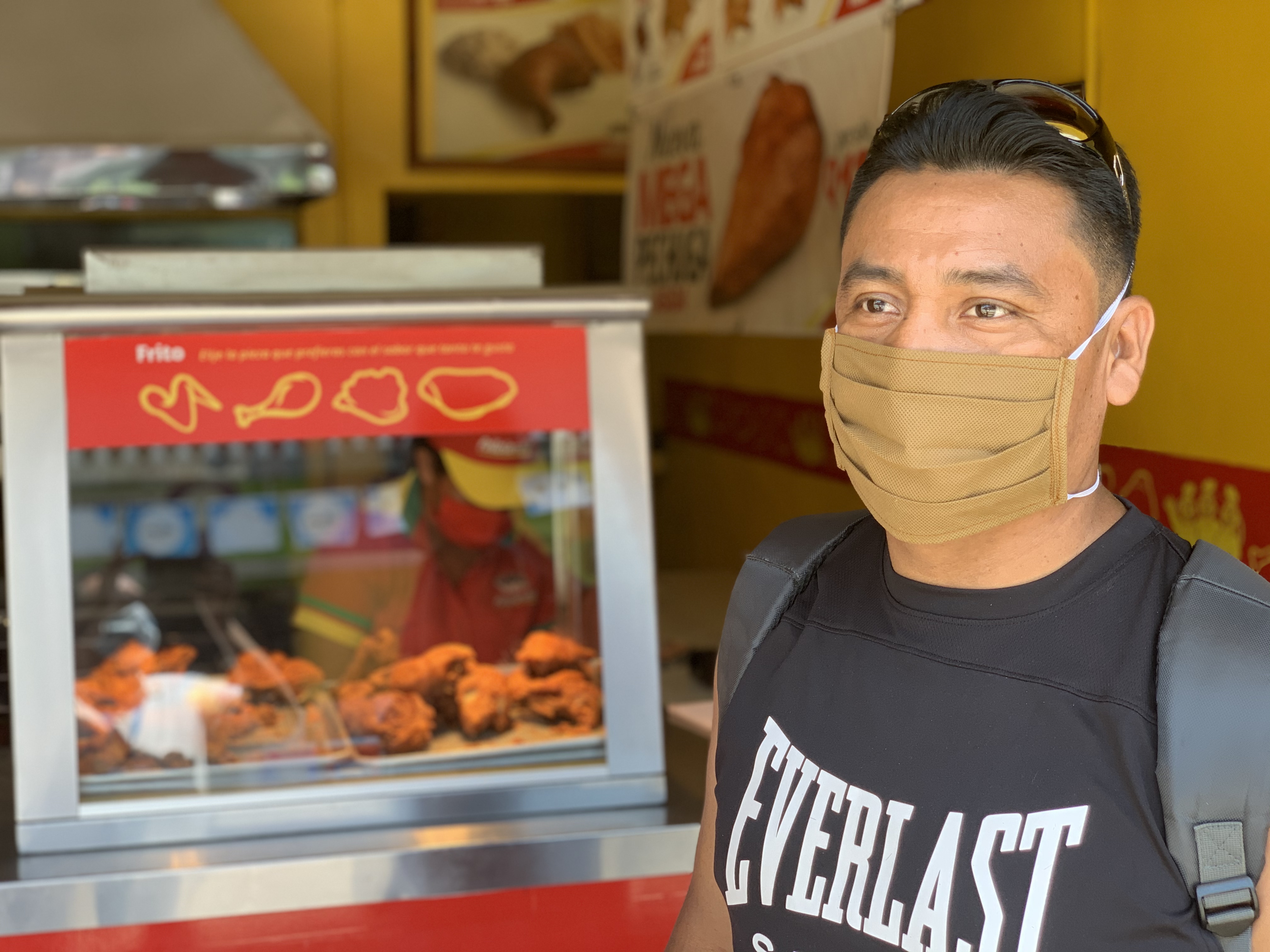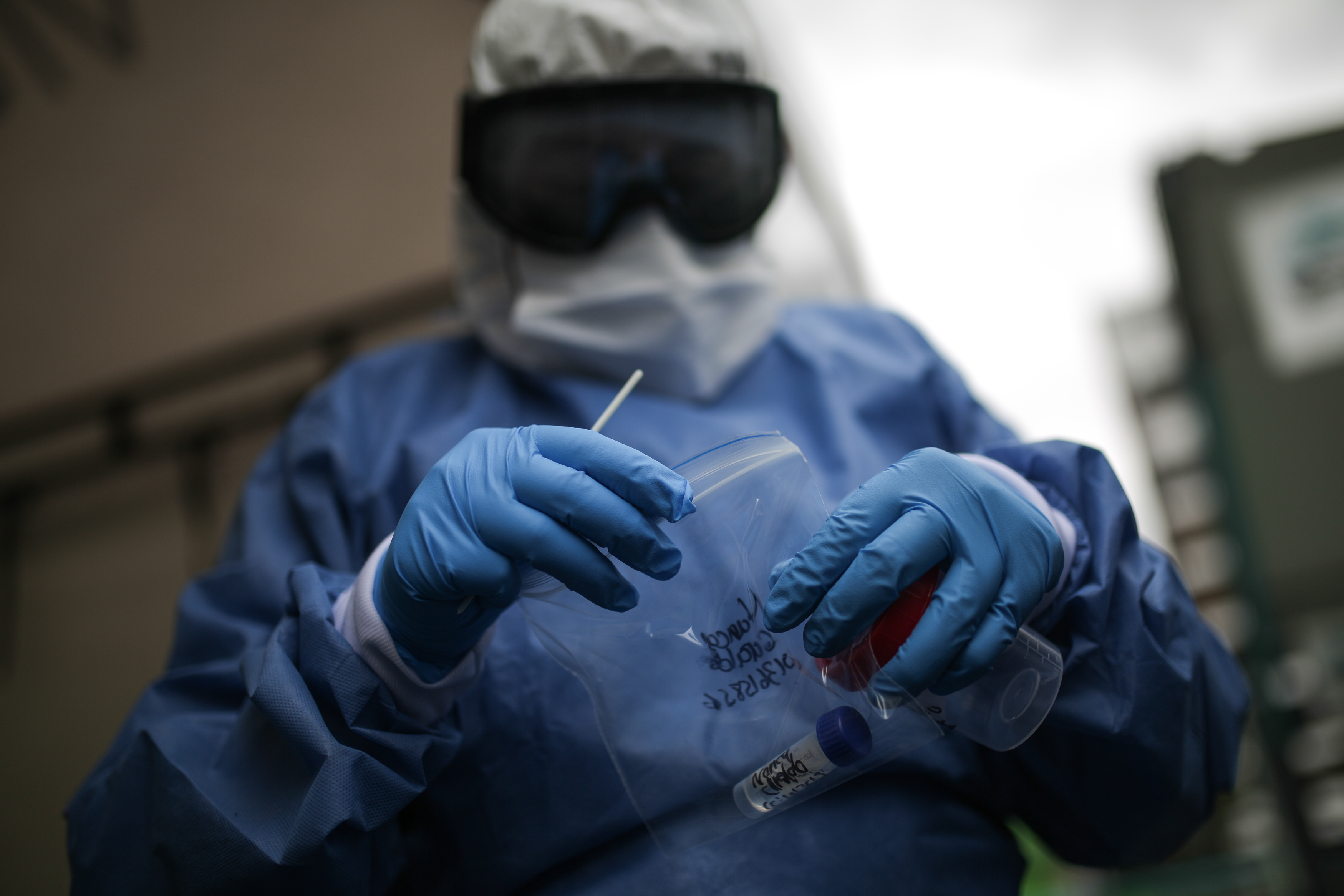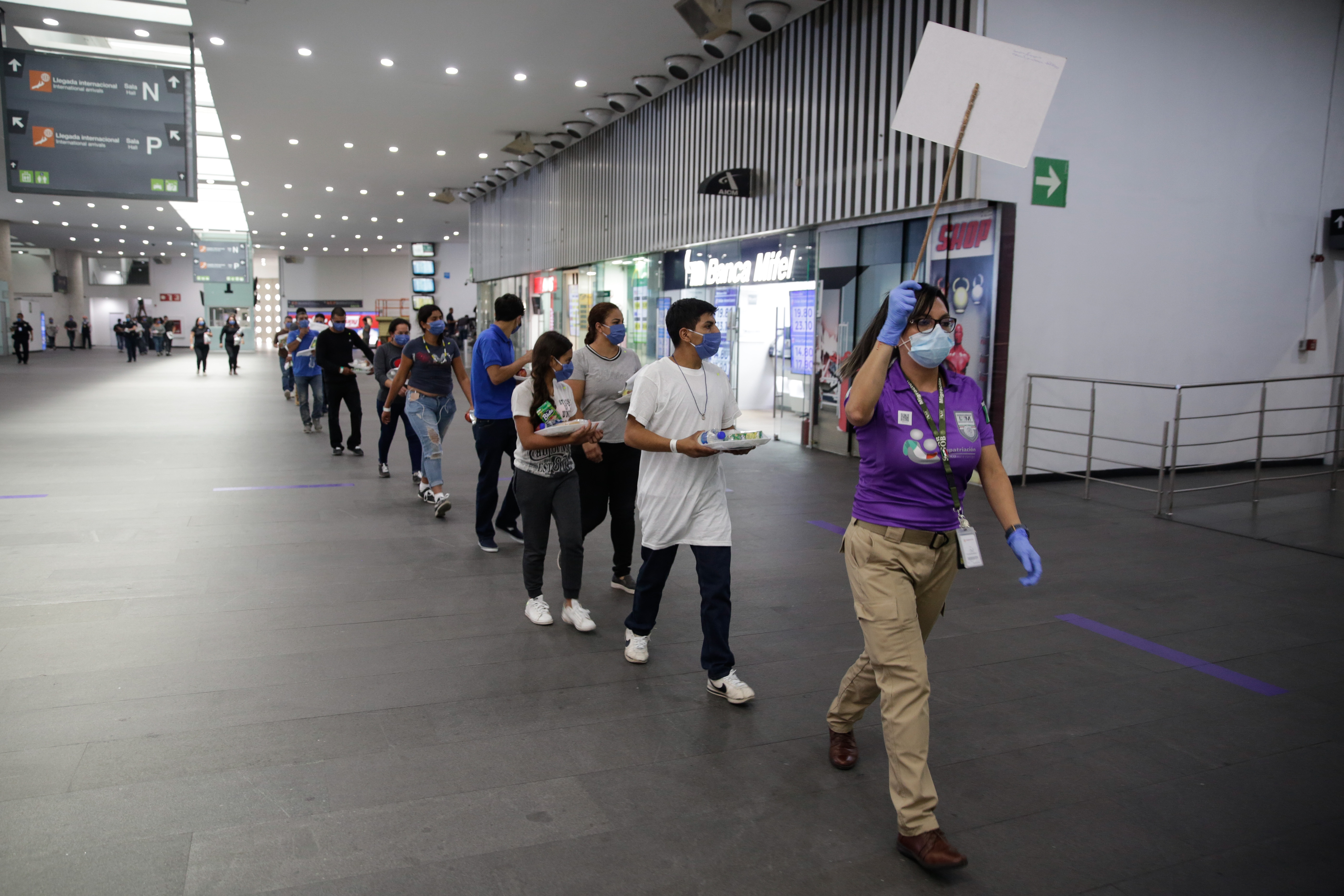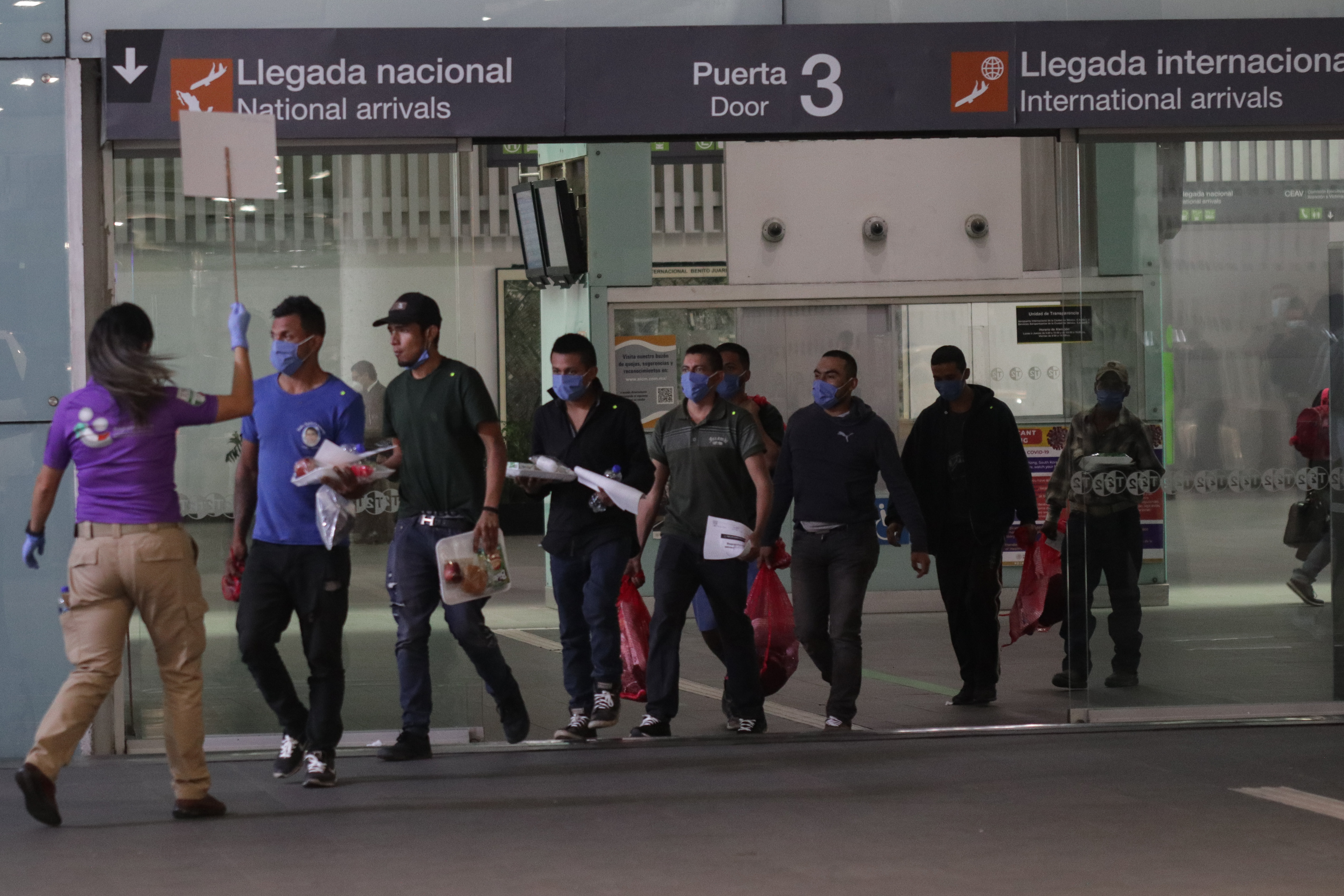-"They never even gave us hand soap or sanitizer for disinfecting," said Canahui, who he has recently returned home after working in the United States for 17 years.
-Overcrowded holding centers and unsanitary conditions have dominated memories of numerous migrants corralled by U.S. immigration authorities.
-The Center for Economic Policy Research, a Washington-based think tank, said in a report that the U.S. administration "has been exporting the virus" from infected detention centers to Latin America.
by Xinhua writers Cui Yuanlei, Shooka Shemirani, Wu Hao
MEXICO CITY, June 7 (Xinhua) -- In the name of containing the spread of COVID-19 at home, the United States has been pushing ahead with its immigration enforcement agenda, deporting thousands of Central Americans, including those who have been infected with the deadly virus, to their home countries amid the ravaging pandemic.
With little or even no sanitary measures in place in crowded holding centers or the deportation process, Washington's business-as-usual approach has disregarded a global health crisis and jeopardized the fragile health systems in less developed countries in Central America.
So far, Guatemala, Haiti, Jamaica and other Latin American countries such as Colombia and Mexico have all reported infected cases in deportees. The United States, with the world's highest number of infections and deaths, is accused of prompting the virus' diffusion in its neighboring region.
"NOT EVEN HAND SOAP"
Marvin Canahui, a 38-year-old Guatemalan migrant, said his own experience was typical of thousands of deportees who were held or deported by U.S. Immigration and Customs Enforcement (ICE) during the pandemic.

Marvin Canahui is pictured in Peten department, Guatemala, May 13, 2020. (Photo by Haroldo Martinez/Xinhua)
"They never even gave us hand soap or sanitizer for disinfecting," said Canahui, who he has recently returned home after working in the United States for 17 years.
He was arrested on Jan. 3 while taking a bus in the south central U.S. state of Texas, because he had no proper documents, said Canahui at his home in the village of Santa Isabel in northeast Guatemala. And he learned about the pandemic from watching TV at an overpopulated holding center in the southeastern U.S. state of Louisiana.
Except in the dining room and telephone area, there was no cleaning or preventive measures such as social distancing in the facility where he shared a dormitory, showers and bathrooms with about 200 other migrants from Guatemala, El Salvador, Honduras and Nicaragua, he recalled.
"It was packed, completely full. There was no room for more people," said Canahui. "They (U.S. authorities) kept bringing in prisoners. We were totally cramped in there."
Before he was deported in mid-April, personnel at the center checked his throat with a plastic tongue depressor, without explaining what it was for or informing him of the result.
After he arrived in Guatemala by air on April 14, immigration authorities there put him and other deportees in quarantine for 14 days at a shelter near the airport, since previous returnees had tested positive for the virus.
Guatemala has so far reported more than 6,000 cases and more than 200 deaths related to COVID-19. Local media reported that at least 102 of the cases were Guatemalans repatriated from the United States.
"I hope we don't end up in the same situation as other countries (with large outbreaks), because I don't know how we would fare if that happens," Elvia Watters, who runs a local health clinic, told Xinhua.
CASE AFTER CASE
Overcrowded holding centers and unsanitary conditions have dominated memories of numerous migrants corralled by U.S. immigration authorities.
A Salvadoran migrant who only gave his name as Carlos was kept at a detention facility in Texas from late January to early April, losing 20 kilos of weight in the process due to existing ailments and the poor conditions.

A medical worker collects samples for COVID-19 tests at a drive-thru site in Bogota, Colombia, May 14, 2020. (Photo by Jhon Paz/Xinhua)
"There was no kind of protection or (special) handling" and more than 80 fellow detainees "were not tested," said Carlos, 31, who fled San Salvador in January after gang members threatened to kill him for failing to pay protection money for his small business.
He said he had hoped to apply for asylum in the United States, but was caught almost immediately by border patrol agents and sent to the "icebox," a slang describing the frigid holding cells to keep detainees.
"I left El Salvador looking for a freer life in the United States, but in the hands of U.S. authorities I almost lost my life," he told Xinhua in a phone interview from a government-run shelter.
David Cruz, a 48-year-old Mexican migrant, said he was given a face mask and his temperature was checked when he was put in a holding cell in McAllen, Texas, but he was held with 27 others in "close, very close" quarters.
He was deported in May by taking one of eight flights designed to speed up the deportation process to Mexico, which is usually done by ground transport.
The objective of these flights is to reduce the spread of COVID-19 "to the United States," U.S. Customs and Border Patrol said in a statement.
However, Latin American experts said the U.S. move amid the COVID-19 outbreak might risk spreading the virus to the south of the United States, especially to the poor rural communities many migrants come from.
On May 4, international medical charity Doctors Without Borders urged the United States to suspend deportations, warning that the move could deteriorate situations in countries poorly equipped to deal with such crisis.
Loic Jaeger, the charity's director for Mexico and Central America, said earlier that deporting migrants without first checking for possible infection was a "criminal policy."

Mexicans deported from the United States arrive at an international airport in Mexico City, Mexico, May 22, 2020. (Photo by Francisco Canedo/Xinhua)
The Center for Economic Policy Research, a Washington-based think tank, said in a report that the U.S. administration "has been exporting the virus" from infected detention centers to Latin America.
According to the ICE, some 943 migrants at more than 45 U.S. detention centers tested positive for COVID-19 after 1,788 tests had been carried out. The total number of migrants held at these centers has reached 29,675 by the end of April.
EXPLOITING PANDEMIC
The United States seems to be exploiting the pandemic to crack down on immigration, said Ruben Figueroa, a member of the Mesoamerican Migrant Movement that defends the human rights of Central American migrants.
"They are taking advantage of this time to impose much stronger restrictions, much stricter security measures. They are violating (the rights of) these people, their communities, and the countries they are from. It's clear, it's obvious," said Figueroa.
In Colombia, infectious disease experts have sounded the alarm on the U.S. move after more than 20 of 64 Colombians deported on March 30 tested positive for COVID-19.

Mexicans deported from the United States arrive at an international airport in Mexico City, Mexico, May 22, 2020. (Photo by Francisco Canedo/Xinhua)
Aristobulo Varon, one of the repatriated, told local press that none of the deportees had been tested, and the validation relied only on the fact that they had presented no obvious symptoms of the novel coronavirus.
Soraya Marquez, an infectious disease expert and coordinator of healthcare recovery at the Juan N. Corpas Clinic in Bogota, said the United States has been careless by flouting standard health protocols amid a raging pandemic that has infected over 6.8 million people worldwide and killed more than 390,000.
"I think it has totally failed, precisely for not following protocols, since the presence of COVID-19 has been proven in patients that are completely asymptomatic, which is why you have to undertake stringent measures, studies and tests to rule out and/or confirm the diagnosis so as not to increase the number of infections," said Marquez.
The U.S. performance in the pandemic has "put many people at risk," she said. "The message is clear: life takes precedence over any other interest."
(Xinhua reporters Yang Chunxue, Yan Liang in Mexico City, Gao Chunyu in Bogota also contributed to the story. Video reporters: Cui Yuanlei, Wu Hao and Yu Lizhen; Video editor: Wu Yao.)



